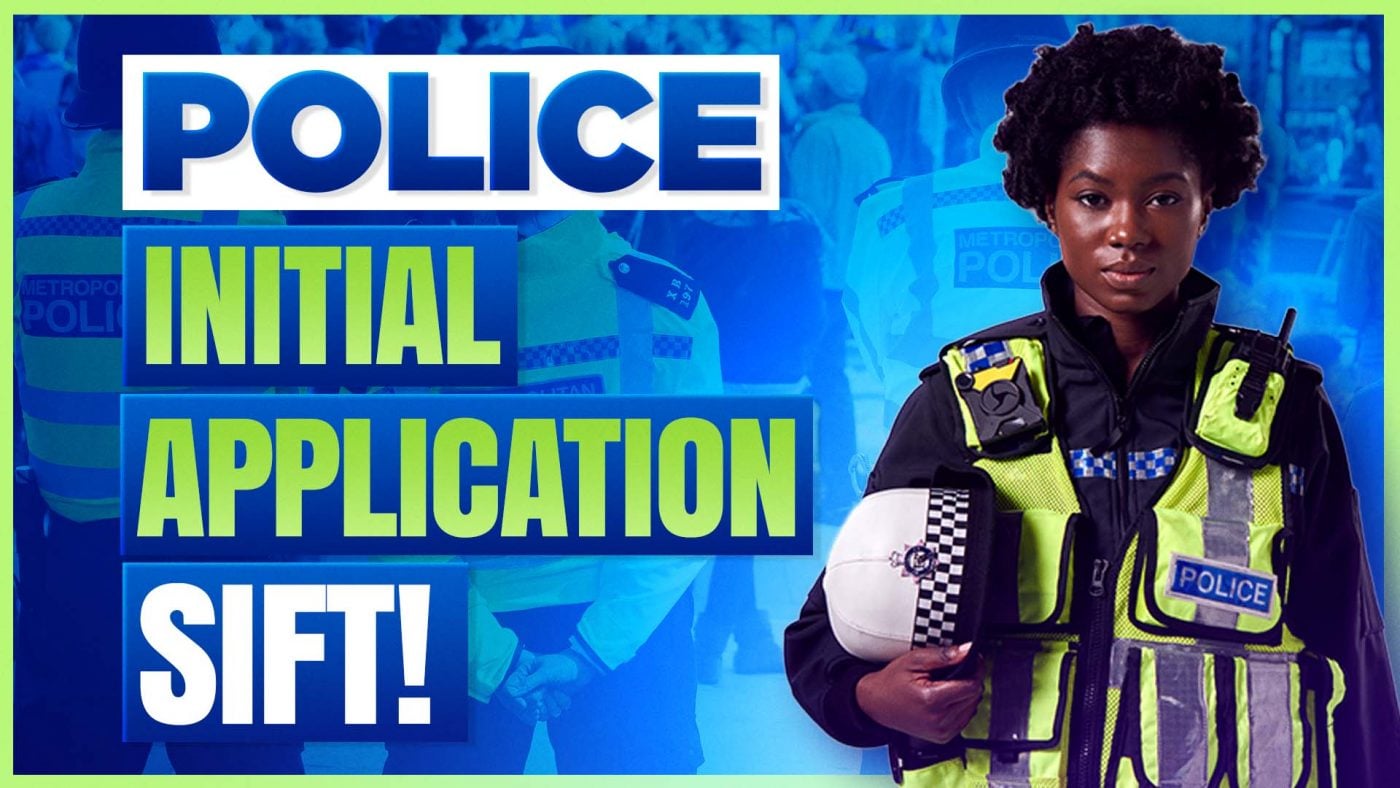Do you know your force’s initial sifting process?
Are you aware that police services can now choose which sifting assessments they can use to assess candidates during the early stages of the selection process, usually soon after the initial application.
This was updated by the College of Policing in November 2021.
The idea of an initial sift is put in place to ensure only candidates who demonstrate the desired competencies and values are successful in making it into the latter stages.
In this post we will take a look at the three different sift options each force can implement during the selection process to select candidates to become police officers.
What is the Sift used for?
During a recruitment campaign, a police service will receive hundreds (if not thousands) of applications to become a police officer, and usually there are only a marginal number of places available for every intake.
So, in light of this, each police service will need reduce the number of applicants for each campaign. This is first usually whittled down by a sift from checking the initial application and eligibility criteria.
After this stage, the remaining candidates will be invited to undertake some initial assessments, which will test each candidate against a set of values and behaviours.
There are seen as vital traits for someone to have if they are going to be a competent police officer.
The values and behaviours are based on the Competencies and Values Framework (CVF). To have any chance of succeeding in the selection process you will not only need to have an excellent knowledge of these, but you will be required to demonstrate these during every assessment and interview. Failure to do so, means you are likely to be rejected at this point.
During the next sections of this post, we will look at the three different types of sift assessments you could face during this early part of the selection process.
In-Force Sift
If you are required to take an In-force sift, you will be informed by the force you are applying to as to what the assessment may consist of. If you check the selection process of the force’s website, this may give you an indication of what the actual assessment could be. This may also depend on your entry route.
Please bear in mind, whatever the assessment is, it will be heavily focused on the CVF. Please see the below list of possible assessments you may have to take as a sifting assessment:
- Verbal Reasoning Test
- Telephone Interview
- Video-Based Assessment
- Situational Judgement Test
- Behavioural Styles Questionnaire

The National Sift
If the force you apply to uses the national sift, then after you complete your initial application, you will be asked to sit the two following assessments:
Situational Judgement Test: In this assessment you will be presented with 15 unique scenarios which you could face as a police officer. Along with the scenario, you will also be presented with four possible responses. Your task will then be to rate each of the answers to a scale from inefficient to highly efficient, the scale consists of the following ratings; Efficient / Fairly Efficient / Inefficient / Counterproductive. Again when rating the answers, ensure you refer to the CVF and ensure your response matches the required behaviours and values. You will have 30 minutes to take this assessment. Please see an example question below:
Sample Question: You are out on patrol in the local neighbourhood, when a woman approaches you and your colleague. She is extremely angry, and using vulgar language.
Woman: ‘Police scum. You can’t trust Old Bill, all they do is cover up. When my house was burgled, the police did nothing! You two are good for nothing, waste of space.’
Please rate the responses below:
- ‘Madam, your comments are totally unacceptable. Unless you have a real complaint, go away’
Efficient / Fairly Efficient / Inefficient / Counterproductive
- Ignore her. She’ll go away eventually.
Efficient / Fairly Efficient / Inefficient / Counterproductive
- ‘Excuse me, Madam, I will ask you to retract your comments. Language like that is not acceptable, and if you continue, we will have to detain you.’
Efficient / Fairly Efficient / Inefficient / Counterproductive
- ‘I’m sorry for the trouble that we have caused you. We’ll do better next time to deal with your problems.’
Efficient / Fairly Efficient / Inefficient / Counterproductive
If you would like more practice on this variation of the Police Officer Situational Judgement Test, you can get this here.
Behavioural Styles Questionnaire: The next assessment you will be required to undertake as part of the national sift is once again totally focused on the competencies and values framework. The test itself will present you with 80 statements which will assess your behaviours in a workplace setting. Your task is to choose from the answer choice which best applies to you. An example question may look like;
Sample Statement: ‘I put the needs of others before my own’.
You will then be presented with a choice of responses which will look something like this: Completely Disagree, Strongly Disagree, Disagree, Neither Agree or Disagree, Agree, Strongly Agree and Completely Agree.
This assessment requires you to answer honestly, as to how you would generally behave at work, but please take note, if your answer does not match the behaviours required of a police officer this is unlikely to be marked highly.
How would you answer the above question? Please post your answer in the comments box at the bottom of the page.
You can find out more about the police behaviour styles questionnaire here.

Online Assessment Centre SJT
The final sift option you could face is a different variation of a Situational Judgement Test. This version of the SJT is the same test you may have faced previously if the force you applied to use the Stage 1 of the online assessment process.
The difference between this SJT and the previously discussed SJT, is you will need only to select the most appropriate action from the answer choices, and not rate each action. In total there are 12 questions.
If you have to undertake this SJT, as it is also part of the online assessment process, you will also have to undertake the Competency Based Interview in the same sitting. So, when deciding to take this test, please ensure you ready to sit the Competency-based interview also.
Please see below example question for this variation of this OAC Situational Judgement Test question.
Sample Question: You’re on patrol, walking through Ficshire Park when you notice a group of teenagers from the local secondary school. One of the teenagers looks upset and is picking up items that have fallen out of their rucksack from the ground.
Do you:
- a) Approach the group, ask what they are doing and suggest they leave the park.
- b) Help the teenager who is picking up their belongings and ask if anyone in the group is picking on them.
- c) Keep an eye on the group whilst continuing your patrol.
- d) Follow the group around the park until they leave.
How would you answer, this question? Please feel free to leave your comments in the section at the bottom of the page.
If you require practice on the OAC Situational Judgement Test, you can find more material here.


I would answer: ‘Completely Agree’
As this would refere to the value public service and putting the public first. ??
That is a good answer which aligns with Public Service – I act in the interest of the public, first and foremost. But we must be mindful of the risks and ‘analyse critically’ when making decisions.
Thank you for your reply. It was helpful.
Can I ask you about the appropriate response to this type of question in the behavioural style questionnaire: Do you consider yourself to be someone who shares information easily?
I would hesitate between ‘Strongly Agree’ (showing transparency) or Somewhat Disagree (keeping information confidential when needed).
I am uncertain of what values and competences are being assessed. Thankyou for your help.
Thank you for your reply. It was helpful.
Can I ask you about the appropriate response to this type of question in the behavioural style questionnaire: Do you consider yourself to be someone who shares information easily?
I would hesitate between ‘Strongly Agree’ (showing transparency) or Somewhat Disagree (keeping information confidential when needed).
I am uncertain of what values and competences are being assessed. Thankyou for your help.